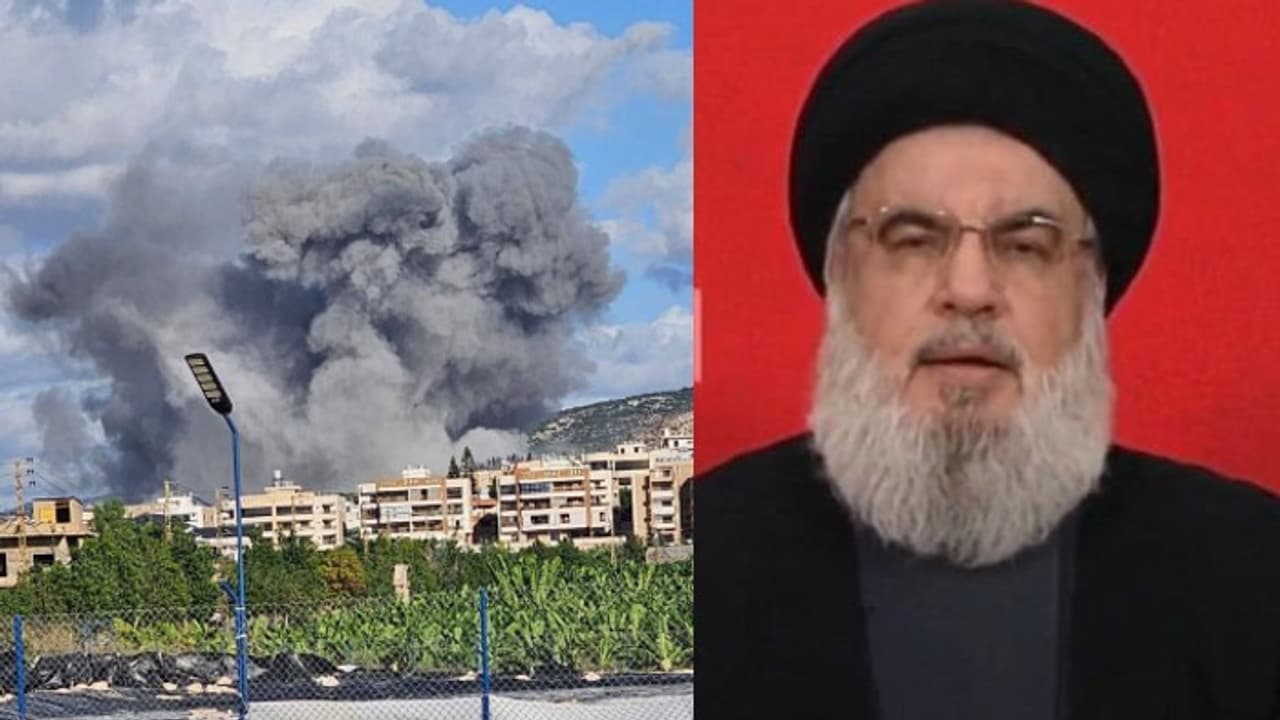In a dramatic escalation of regional tensions, Israeli warplanes launched a fresh wave of airstrikes on Hezbollah targets in southern Lebanon on Thursday.
In a dramatic escalation of regional tensions, Israeli warplanes launched a fresh wave of airstrikes on Hezbollah targets in southern Lebanon on Thursday. The strikes, according to the Israel Defense Forces (IDF), are part of ongoing efforts to dismantle Hezbollah’s terrorist infrastructure and enable the safe return of displaced Israeli residents in northern Israel.

Israeli fighter jets carried out the airstrikes shortly after breaking the sound barrier over Beirut, causing panic among residents as they rattled windows and filled the sky with the remnants of flares. The low-flying jets flew the closest to the city they have been since the start of hostilities in October. This coincided with a highly anticipated televised address by Hezbollah’s leader, Hassan Nasrallah, marking his first public remarks since a series of deadly pager explosions rocked Lebanon earlier in the week.
Nasrallah, in his speech, characterized the pagers and walkie-talkie explosions, which killed at least 37 people and injured over 3,000, as a "war declaration" by Israel. “This criminal action crossed all red lines,” Nasrallah declared, claiming that the attacks, including those targeting civilians and medical personnel, were aimed at sowing fear and devastation. He accused Israel of attempting to weaken Hezbollah’s operational capacity and undermine its leadership.
Despite the blows to Hezbollah’s infrastructure, Nasrallah asserted that the group’s resolve remains unshaken. He insisted that the Lebanese front would continue its operations until the war in Gaza ceases, stating, “No matter the sacrifices, no matter the scenarios, the resistance will not stop supporting our brothers in Gaza and the West Bank.” Nasrallah also warned Israel’s Prime Minister Benjamin Netanyahu that Hezbollah’s strikes would persist, ensuring that northern Israeli residents would not be able to return to their homes as long as hostilities continue.
“The Israelis intended these attacks to break us apart, but they have only strengthened our resolve,” Nasrallah said, noting that Hezbollah’s leadership remained united despite attempts to divide them. He accused Israel of using pagers and walkie-talkies as weapons to inflict maximum damage, especially targeting medical workers and civilians.
The pager explosions, which Nasrallah claimed were intended to kill thousands in an instant, hit hospitals, pharmacies, markets, homes, and vehicles. “The enemy’s goal was to inflict a massacre,” he said, calling the action an unprecedented crime. The explosions have drawn widespread condemnation from Hezbollah and its regional allies, including Iran.
Hossein Salami, the commander of Iran's Revolutionary Guards, echoed Nasrallah’s sentiment, warning that Israel would face a “crushing response” from the axis of resistance, a term used to describe the alliance between Iran, Hezbollah, and other regional militant groups.
The IDF confirmed that its forces are continuing to strike Hezbollah positions in Lebanon. The Israeli military stated that the airstrikes are designed to cripple Hezbollah’s ability to operate, including its use of civilian homes and infrastructure as shields. “For decades, Hezbollah has weaponized civilian homes, dug tunnels beneath them, and used civilians as human shields,” the IDF said in a statement.
Israel has not officially taken responsibility for the pager explosions, but multiple security sources have attributed the operation to Mossad, Israel’s national intelligence agency. The blasts have reportedly dealt a significant blow to Hezbollah, although Nasrallah downplayed the impact, claiming the group’s infrastructure remained “mighty and coherent.”
As tensions in Lebanon reach new heights, Nasrallah emphasized Hezbollah’s commitment to supporting the Palestinian resistance in Gaza. He condemned the Israeli strikes in southern Lebanon as an attempt to draw Hezbollah into an all-out war, but vowed that the group would not abandon its support for Gaza until the war ends. “The aim of Israel is to bring Hezbollah to its knees, but we will not stop until every aggrieved in Gaza and the West Bank sees justice,” Nasrallah said.
The Israeli-Lebanese front has once again flared into open conflict, with both sides digging in for a potentially long and bloody confrontation. As Israel intensifies its strikes on Hezbollah positions, the group’s leader has vowed not to back down, framing the pager explosions as a declaration of war that demands retribution. With Hezbollah’s continued operations on the Lebanese front and Israel’s commitment to achieving its war objectives, the path to de-escalation appears uncertain, and the conflict threatens to spill over into a broader regional crisis.
